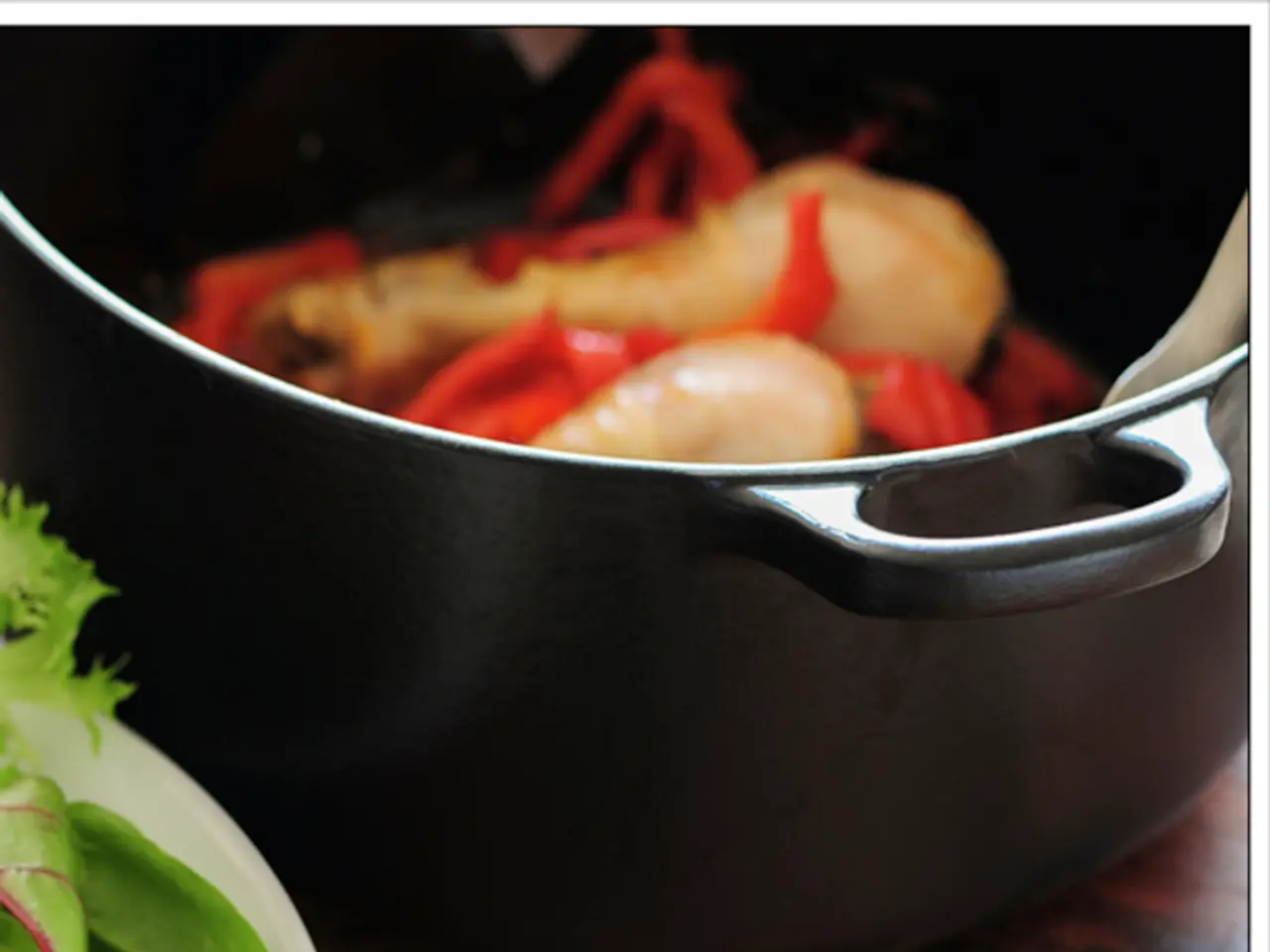Low-Calorie Foods for Potential Weight Reduction
Low-Calorie, Nutrient-Rich Foods for Weight Loss: A Comprehensive Guide
In the pursuit of a balanced diet that supports weight loss, focusing on nutrient-dense, low-calorie foods is crucial. Here's a list of such foods, along with their nutritional benefits.
Vegetables:
- Spinach is a well-known powerhouse of iron, vitamins A, C, and B6, as well as manganese. A cup (25 g) contains approximately 7 calories.
- Cauliflower is a rich source of vitamin C, with one cup (100 g) containing approximately 25 calories.
- Jicama (Mexican potato) is packed with vitamins and minerals, including vitamin C, fiber, iron, potassium, and manganese. A 100-g serving has approximately 45 calories.
- Red cabbage offers a low-calorie (15 calories per cup or 70 g) option, rich in vitamins and antioxidants.
- Chard is highly nutrient-dense, containing antioxidants, fiber, calcium, iron, vitamins C, E, B6, and K. A 100-g serving contains approximately 20 calories.
- Leeks are a good source of calcium, iron, vitamin C, and B vitamins, with a standard-sized leek having approximately 60 calories.
- Turnip is rich in vitamins C and B6, potassium, calcium, and fiber, with one cup (130 g) containing approximately 37 calories.
- Broccoli is an excellent source of fiber and contains many vitamins and minerals, including vitamins A, C, E, K, and B vitamins. A 90-g cup of broccoli florets contains approximately 31 calories.
- Okra is rich in folate, vitamin A, and magnesium, with one cup (100 g) containing approximately 33 calories.
- Rutabaga is an excellent source of antioxidants such as vitamin C, as well as calcium, potassium, magnesium, and vitamin E. One cup (140 g) contains approximately 64 calories.
- Green beans offer nutrients like B vitamins, vitamin K, and vitamin C, with a 100-g cup containing approximately 31 calories.
Fruits:
- Watermelon is hydrating, rich in vitamin C, and contains just 46 calories per cup.
Other Foods:
- White mushrooms offer vitamin D2 and support heart and bone health, with half a cup (35 g) containing just under 10 calories.
- Celery is very low-calorie (about 5.6 calories per stalk) and high in vitamins E, C, K, and A.
- Kale is a superfood rich in manganese, protein, and antioxidants.
- Cucumbers are high in water, antioxidants like quercetin, and magnesium, aiding digestion and inflammation reduction.
- Carrots are packed with vitamins C, K, and B vitamins. A small carrot (5.5 inches) is approximately 25 calories.
Other Low-Calorie Foods and Beverages:
- Vegetable broth contains just 15 calories per cup.
- Hot sauces, such as Tabasco, contain just 1 calorie per teaspoon.
- Lemons and limes make a great vitamin C-rich alternative to salad dressing, with one fluid ounce (fl oz) of lemon or lime juice containing just 6 calories.
- Coffee contains just over 2 calories per cup if drunk black without adding sugar, cream, or milk.
- Miso broth contains 60 calories per 245-mililitre serving.
- Tea contains just over 2 calories per cup (8 fl oz) as long as a person does not add milk to it. This includes herbal teas such as green tea, chamomile, and mint.
- Marmite is one of the least calorific spreads, containing just 2 calories per teaspoon and is a good source of B vitamins.
- Mustard contains 5 calories per tablespoon.
- Unsweetened cocoa powder contains just 12 calories per tablespoon.
- Onions contain between 24 and 40 calories per 100-g serving, depending on the variety.
Additionally, including healthy fats like avocados, nuts, seeds, olive oil, and fatty fish in moderation helps promote fullness and metabolism support despite their higher calorie density.
By incorporating these nutrient-dense, low-calorie foods into your diet, you can enhance fullness, reduce overall calorie intake, and facilitate weight loss, all while providing essential nutrients.
- Incorporating spinach, a vegetable rich in iron, vitamins A, C, B6, and manganese, can support health-and-wellness while adding only 7 calories to your diet.
- Consuming cauliflower, which contains vitamin C and offers approximately 25 calories per cup, may enhance your nutritional intake without contributing significantly to your weight-management concerns.
- Jicama, a Mexican potato packed with vitamins and minerals, including vitamin C, fiber, iron, potassium, and manganese, can be a low-calorie, nutritious addition to your meal with about 45 calories in a 100-g serving.
- Red cabbage, providing a low-calorie, antioxidant-rich option, can be an excellent choice for those seeking nutrient-dense, low-calorie foods, with 15 calories in a cup or 70 g.
- Chard, a nutrient-dense vegetable containing antioxidants, fiber, calcium, iron, vitamins C, E, B6, and K, can be enjoyed with minimal impact on your weight-management plan, as a 100-g serving offers approximately 20 calories.
- Recognizing the benefits of leeks for heart and bone health, you may consider adding this low-calorie food source of calcium, iron, vitamin C, and B vitamins to your meals, with a standard-sized leek offering around 60 calories.
- Turnip, rich in vitamins C and B6, potassium, calcium, and fiber, can be a beneficial low-calorie food choice, contributing approximately 37 calories to a cup (130 g) serving.
- By understanding the predictive role of healthy, low-calorie foods like broccoli, packed with fiber and multiple vitamins and minerals, and containing only 31 calories in a 90-g cup of florets, you can make informed decisions when managing your weight while leveraging the essential nutrients these foods provide. Additionally, incorporating healthy fats like avocados and nuts in moderation can help promote fullness and metabolism support, despite their higher calorie density.




